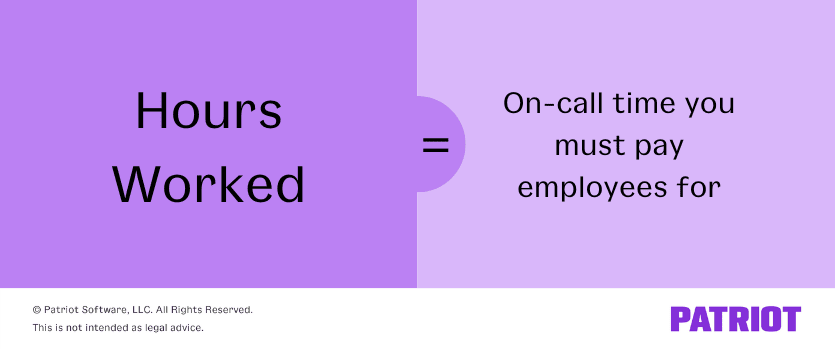Some businesses need on-call employees. But if you require employees to be available when they’re not working, should you pay them? Whether or not you must provide on-call pay depends on a few factors.
If you’re not paying your employees while they’re on call, you might be violating FLSA hours worked, and thus overtime, rules. And we all know that violating FLSA regulations is a recipe for hefty penalties.
It’s time to spruce up your on-call labor laws knowledge.
What does on-call mean?
Being on call means an employee is available to work if their employer contacts them. An employee who is on-call isn’t working, but they are available in case they need to. Employees who are on call may need to remain at or near their workplace.
Unpredictable businesses (e.g., hospitals) may use on-call shifts. Some examples of on-call jobs include:
- Nurses
- Doctors
- Repair workers
- IT technicians
- Retail workers
Under the Fair Labor Standards Act, on-call hours may or may not be considered hours worked.
If on-call hours count as hours worked, you need to pay your employees for their on-call time.

If on-call hours are not considered hours worked, you do not need to pay your employees while they wait. However, you must pay employees when they respond to a call.
There are many factors that influence whether you must provide on-call compensation or not. Remember, FLSA regulations only apply to nonexempt employees. You do not need to provide on-call pay for exempt employees.
When should you provide on-call pay?
Federal on-call pay laws require you to compensate employees for hours worked. And, hours worked depends on a number of conditions.
Oftentimes, the FLSA determines on-call pay requirements case by case. However, the Department of Labor offers general guidelines for determining on-call pay.
On-call work laws boil down to whether the employee is restricted or not. If the employee is restricted, their time is generally considered hours worked, and you must give on-call pay. If the employee is not restricted, you likely don’t need to compensate them for their waiting time.
Restricted vs. non-restricted on-call status depends on two main things: location and the employee’s ability to use their time.
Location comes first. From there, break it down further to determine how the employee can use their time.
First, examine the employee’s location. Ask yourself:
- Does the employee need to remain on or near your business’s premises while on call?
- Is the employee free to go where they’d like while on call?
1. Employee must remain on or near the premises
An employee’s time is considered hours worked when they are at or near your business. On-call hours are also considered hours worked if you control where workers can go.
Because the time is considered hours worked, you generally need to provide on-call pay.
Let’s say you require a nurse to stay at the hospital while they are on call. The nurse might be able to take a nap or watch TV, but their time is still considered hours worked. Why? Because they must stay at the hospital.
2. Employee can leave the premises
If the employee is not restricted to being at or near your business’s premises, determine whether they can use their time for personal activities.
To find out if the employee can use their time for their own purposes, ask questions like:
- Can the employee use the time to engage in personal activities?
- How frequently do you call the employee while they are on call?
- After receiving a call, how long does the employee have before responding?
Restricted activities, frequent calls, and immediate action may prevent an employee from using their time for personal activities.
A. Employee can use their on-call time for personal activities
If the employee can use on-call time for personal activities, you likely do not need to pay them while they wait.
Again, you must pay the employee for the time they spend responding to a call.
Say an on-call employee spends the day at the mall. During a four hour on-call shift, they receive one call that requires them to stop what they’re doing for 30 minutes. Pay them for their 30 minutes of work. But, you don’t need to pay them for the other three hours and thirty minutes.
B. Employee cannot use on-call time for personal activities
When an employee’s personal activities are restricted, you typically need to provide on-call pay.
Let’s say an employee is reading a story to their child when you call them. The employee puts down the book and drives to work. After responding to the call, the employee returns home and continues reading the story to their child. Again, their phone goes off. The consistent phone calls prohibit the employee from engaging in personal activities. As a result, you need to provide on-call compensation for the entire on-call shift.
Other considerations: state laws and business policies
In addition to federal on-call laws, you need to know your state’s laws. Some states set stricter on-call pay laws. For example, California on-call laws extend to employees calling in to find out if they have to work.
Brush up on your state’s on-call pay laws to stay compliant.
Even if you are not required under federal or state laws to provide on-call pay to employees whose time isn’t restricted, you can choose to do so.
Be sure to include your business’s on-call policy in your employee handbook.
Quick reference for determining on-call pay
Here are some questions you must ask when determining whether an on-call employee’s time is considered hours worked:
- Is the worker an exempt or nonexempt employee?
- Is the employee required to stay on the business premises?
- Do I restrict the employee’s on-call time?
- What does my state say?
- What do my business’s policies state?
If you have trouble determining whether you need to provide on-call pay, check out the Department of Labor’s website or consult a small business lawyer.
Don’t neglect to pay an employee for legal hours worked. Use Patriot’s online payroll software to accurately calculate wages and taxes. If you have questions, our free support is only a call or click away. Get your free trial today!
This article has been updated from its original publication date of 3/10/2011.
This is not intended as legal advice; for more information, please click here.

